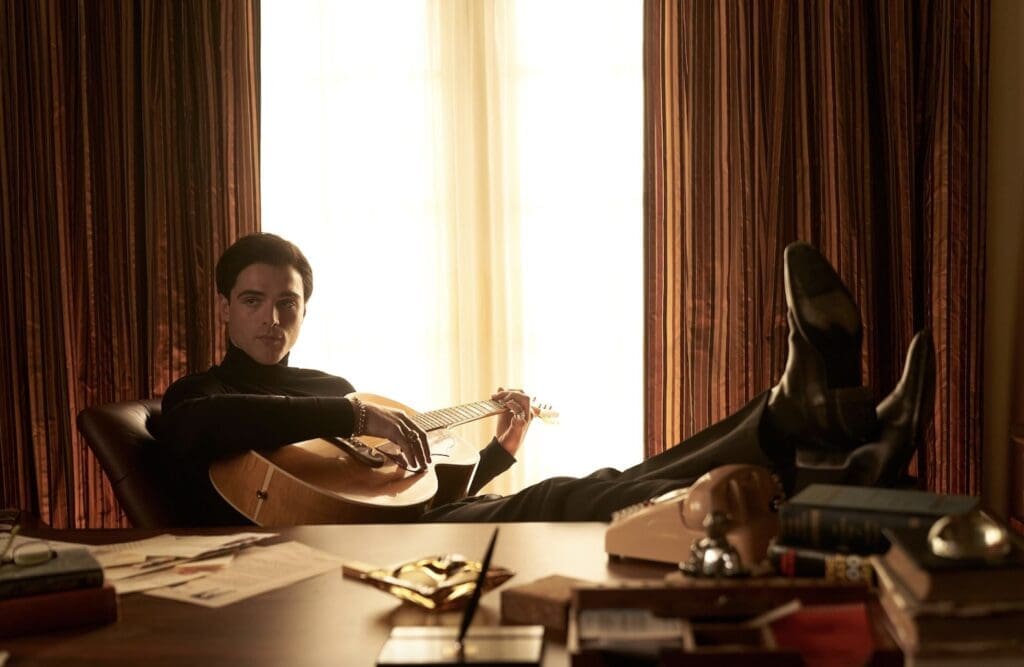A little over a year since the release of Baz Luhrmann’s Elvis, Academy Award winning director Sofia Coppola is shifting audience perspective with Priscilla.
Based on the 1985 autobiography Elvis and Me, the A24 biopic follows Priscilla Presley (Cailee Spaeny) through her fourteen-year courtship and marriage to the “King of Rock and Roll” (Jacob Elordi).
In contrast to the grandeur of Luhrmann’s film, Priscilla is vividly authentic in its simplicity.
The film cinematically opens to a cloud of Aqua Net hairspray. As the aerosol droplets settle on Priscilla’s iconic teased hair, the audience is introduced to the 60’s era Priscilla and her razor sharp cat’s eye makeup.
Coppola uses hairstyle throughout the film to visually mark the passage of time and Priscilla’s emotional growth. As noted by Spaeny in an interview with Vanity Fair, Priscilla’s evolving hair and makeup “was such an important part in Priscilla’s journey and a marker of where she was emotionally, where she was with him and how she was herself.”

When a 24 year old, Germany stationed serviceman Elvis meets 14 year old Priscilla, her light dirty blond hair is tied back to reveal a bare face and youthful innocence.
Captivated by Elvis’ charm, Priscilla accepts his invitation to move to Memphis. Her move to Graceland and adopted obligatory support of Elvis sets the scene that catapults her into a new world, leaving her innocence and self behind. Coppola denotes this major transition by styling Priscilla with jet black hair and severe eye makeup.
As she grows older, more experienced, and more confident, Priscilla’s hair style becomes more subdued and her makeup less drastic.

Although the visual aesthetic is very much a part of the storytelling, Spaeny’s brilliance is also a large part of this nuanced performance. Behind glossy eyes and subtle movements, Spaeney demonstrates a spectrum of emotion, giving a performance that has already drawn praise from the Venice Film Festival, which named her Best Actress.
The Australian Jacob Elordi effortlessly embodies Elvis. Elordi’s disarming charm and deep southern register so closely mirror that of the legendary heartthrob that his screen portrayal even unnerved Priscilla.
“When we watched the film with Priscilla the first time, what struck her the most was how much his voice sounded like Elvis, so that was a big thrill,” Coppola told Vanity Fair.
Although Elordi’s performance is authentic and recognizable, his mumbled lines make many scenes less impactful.

Elordi first rose to prominence with his breakout role as Nate Jacobs on HBO’s Euphoria. The sliminess and repellence of that character primed him for Elvis’ not so alluring side. In this retelling, Elordi uncovers another hot-tempered and headstrong version of Elvis that was only shared with his family and Memphis Mafia behind closed doors. Audiences see this in moments like when Elvis hurls a chair in Priscilla’s direction when he doesn’t like her response to his question.
Despite the film being supported by Priscilla, who executive produced the project, Elvis and Priscilla’s late daughter Lisa Marie Presley was vehemently opposed the making of the film and urged Coppola to reconsider, calling the script “shockingly vengeful and contemptuous” in an email exchange with Coppola obtained exclusively by Variety.
Lisa Marie’s concerns rose from the unsavory depictions of her father as a Devil in Disguise and the shocking revelation of the 10-year age difference between a teenage Priscilla and 24-year-old Presley.
Through a representative, Coppola shared her email response to Lisa Marie Presley’s concerns with Variety, writing, “I hope that when you see the final film you will feel differently, and understand I’m taking great care in honoring your mother, while also presenting your father with sensitivity and complexity.”
In just under two hours, Coppola finds a balance between Priscilla’s genuine care for Elvis and the musician’s deep character flaws. Elvis’ emotional manipulation and alleged grooming are not lost on the audience or Coppola.
This film’s flawed Elvis and Coppola’s choice to provide the audience with a lens filtered through Priscilla’s eyes may or may not lay the groundwork for the legendary Elvis to stumble or fall from Graceland, but it certainly provides a glimpse into the “idyllic” relationship, marriage and icon and how it all fell apart once Priscilla found what she was really looking for.
“Did I lose you to another man,” Elvis asks as their marriage reaches its end.
Empowered, Priscilla responds, “You lost me to a life of my own.”
Featured photo credit: Philippe Le Sourd/A24